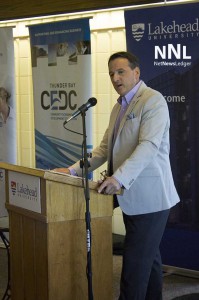

HOUSTON – POLITICS – Minister Greg Rickford Canada’s Minister of Natural Resources and United States Secretary Moniz re-affirmed their commitment to our continental approach on energy and the environment based on bilateral and trilateral agreements signed in Ottawa (September 2014) and Washington (December 2014).
The Minister and Secretary noted important milestones achieved over the past several months, including the bilateral agreement they signed in January 2014 to improve collaboration in civilian nuclear energy research and development.
They also discussed their ongoing cooperation in support of Ukraine’s energy security.
Minister Rickford expressed Canada’s strong interest in aligning environmental standards in new areas, including oil and gas, that build on our existing progress while protecting jobs and economic growth on both sides of our shared border.
Rickford articulated Canada’s enthusiasm for participating in bilateral and trilateral mechanisms that would enhance cooperation on continental energy security, economic growth and the environment.
Rickford raised Canada’s position that the proposed Keystone XL pipeline should be approved based on the US State Department Environmental Assessment.
This project will replace same or higher-emitting crude from sources like Venezuela with a secure, reliable supply from Canada, North Dakota and Montana.
Minister Rickford and Secretary Moniz agreed to meet again at the G7 Energy Ministerial in Hamburg, Germany, to further enhance bilateral and trilateral energy priorities.
Remarks Delivered by Minister Greg Rickford

It’s great to be here today and to join my colleagues Secretary Moniz and Secretary Coldwell.
Last time we met, we had a very productive meeting, enhancing North American energy cooperation in three strategic areas.
Canada remains firmly committed to continental cooperation that enhances energy security, environmental performance and economic growth across our shared borders.
In a world where energy security is an increasingly important part of national security, Canada’s priority is strengthening our partnership as reliable and responsible producers and suppliers of energy – while advancing our global competitiveness.
Energy Security
With natural gas reserves of 71 trillion cubic feet and crude reserves of over 172 billion barrels, Canada is well positioned to contribute to global energy security.
Indeed, between 2005 and 2014, Canadian crude exports increased by 81 per cent – or almost 1.3 million barrels per day.
We’ve begun shipping our oil into eight new markets, from Italy, the United Kingdom to Singapore.
And, with the European Parliament’s Fuel Quality Directive confirming that oil sands crude is as environmentally responsible as other sources, we expect exports to continue to grow.
Environmental Performance
Canada also sees tremendous potential to make North America a leader in clean energy.
Indeed, Canada is the second fastest growing clean energy market in the G20 after Japan.
Canada has one of the cleanest electricity mixes in the world. Almost two-thirds of our electricity comes from renewable sources — the highest rate of any G7 nation.
In the oil sands, the 13 largest producers are sharing intellectual property, innovation and technological advancements to continually improve their environmental performance.
Canada also offers an abundance of alternate energy, including wind, where we are 7th in the world in terms of total wind power installed capacity.
And we are the second largest producer of uranium.
Just last week, an agreement was reached providing India with over seven million pounds of uranium concentrate over the next five years for electricity generation.
Closer to home, the recent Presidential permit for the American portion of a Quebec-New York hydro line is a great example of what we can accomplish together.
Canada has also joined with the United States to align regulations in the transportation sector, reducing emissions in this important sector.
We remain enthusiastic about any opportunities to align and harmonize emissions standards with our largest trading partners.
Economic Growth
To build on our impressive environmental record, Canada has focused on getting its economic fundamentals right, creating one of the world’s most favourable investment climates.
Since 2006, we have reduced the tax rate on new business investment by almost half — from 33 to 17.5 percent.
Just yesterday in our government’s budget, we confirmed our priority of accelerating the capital cost allowance for liquefied natural gas projects from eight to 30 percent.
According to KPMG, total business tax costs in Canada are now the lowest in the G7.
And, as part of our plan for Responsible Resource Development, we’ve streamlined the regulatory process – eliminating duplication while enhancing environmental protection.
A Record of Progress
Last September, I hosted Secretary Moniz in Canada where we signed the Canada-U.S. MOU on Energy Cooperation. Since then, we’ve made important progress:
• holding two Canada-U.S. contingency planning exercises with Ukraine officials to enhance global energy security;
• conducting a side-by-side comparison of US-Canada regulations to facilitate cross-border trade and save consumers money; and,
• sharing best practices and technologies to increase the use of natural gas vehicles in both countries.
And that’s the short list.
And, as I previously mentioned, last December Canada, Mexico and the United States signed an important trilateral agreement consolidating principles guiding our North American partnership.
The next month, I was in Houston celebrating the completion of the Seaway Twin and Flanagan South Pipelines that are expected to double access of Canadian crude to the US Gulf Coast.
These two projects symbolize the integrated nature of our energy grids.
Thirty-four major international power lines and 70 pipelines crisscross the Canada-U.S. border.
And, as you might be aware, Canada believes that number should grow to 71, by building Keystone XL — the most modern and resilient means of transporting oil from Canada, Montana and North Dakota across North America.
Conclusion
Let me close with a clear message: Canada’s vast resources, environmental commitment and economic fundamentals make us to be a significant contributor to North American energy security.
Together we are enhancing continental cooperation in areas that further that security, protect the environment and promote jobs, competitiveness and opportunities.
Estoy ansioso de continuar a trabajar con el Secretario Coldwell y con el Secretario Moniz en esta gran iniciativa continental.
I look forward to continuing work with Secretary Coldwell and Secretary Moniz in this great, continental initiative.
One that will secure the future prosperity of our three nations and create unimagined opportunity for our people.
I appreciate what everyone is doing for the energy opportunity broadly speaking here at CERAWeek.
…The interests of North American energy security
…And, the North American energy advantage.
Thank you.






